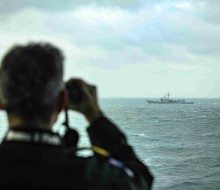
NZDF bolsters North Korea sanctions enforcement with HMNZS Aotearoa and P-8A Poseidon
08 December 2025
Unfortunately you are viewing this website on an outdated browser which does not support the necessary features for us to provide an adequate experience. Please switch to a modern browser such as latest version of Google Chrome, Mozilla Firefox, Apple Safari or Microsoft Edge.
Ngā mihi nui
A tri-service New Zealand Defence Force team of drone pilots is in the United Kingdom participating alongside 13 other militaries at the Military International Drone Racing Tournament (MIDRT)
On face value, it may look and feel like a sporting event; but in reality, it’s a cornerstone activity for a crucial capability for the New Zealand Defence Force (NZDF) and partner militaries - first-person view (FPV) drones, or uncrewed aerial systems (UAS).
“Drone racing has existed for at least the last decade, but over the last three years in particular those skills have transferred directly to the battlefield,” said Major Richard Adams, the New Zealand Army’s lead on uncrewed systems.
“While MIDRT UK 25 is a drone racing event, at its core it is building and testing combat skills that are crucial for combat effectiveness within the NZDF.”
The tournament is the premier FPV drone racing activity for militaries around the world and this year is the fifth and largest iteration of the event to date.
The tournament got underway on Tuesday at the Royal Military Academy in Sandhurst, with the NZ Army-sponsored team taking on a variety of tasks and challenges.
Teams compete in standard drone racing events involving laps around a course, with additional events focusing on aspects more directly relevant to the modern battlefield. These include a ‘find and strike’ challenge, with teams working in tandem to locate and strike a target on the ground with a drone, as well as a simulated bomb drop challenge, with pilots dropping an item from a drone onto a target.
Sergeant Reuben Ellett, a Reserve Force soldier with the NZ Army’s Signals Corps, is captaining the five-person team, and has participated in drone racing since 2019. He said that even six years ago, senior military leaders both within the NZDF and other militaries saw the opportunities that drones could offer.
“Since the invasion of Ukraine by Russia in 2022 we’ve seen FPV UAS become a significant combat capability, and a key technology in both offence and defence,” said Sergeant Ellett.
“Competing in military drone competitions offers huge value in testing our skills against military partners. It’s a bit like a shooting competition, where marksmanship and weapon-handling skills can be tested, and then those skills are directly transferrable to improving your combat effectiveness. In trying to operate a drone faster, more accurately and with more skill, we are building the fundamental skills required to operate weapon systems of the future.”
The NZDF Drone Racing Team participating at the Military International Drone Racing Tournament at Royal Military Academy Sandhurst in the UK
FPV drones and other unmanned technology has developed rapidly in recent years, and the NZDF continues to evolve and advance its unmanned capabilities in line with our ally and key partner militaries.
The NZ Army is also working alongside New Zealand-based companies to advance its organic UAS capabilities, most recently with an FPV drone course hosted at Burnham Military Camp, where personnel learned how to rapidly build and operate small drones.
“We’re seeing FPV drones contribute a vital effect within combat systems the world over – not only do they increase possible strike options on the battlefield, but they enhance soldier survivability and lethality,” said Major Adams.
The NZDF continues to explore various drones and is working alongside the Ministry of Defence to strengthen its UAS capability in terms of scale and types of system.
“It’s also worth recognising that drones are not the answer to modern conflict in and of itself – there is still a strong requirement for modern and traditional capabilities to operate as an integrated combat system, and that’s where we see the huge value and potential in where this technology is going,” said Major Adams.
The drone racing tournament continues through to the end of the week, with the NZDF team fighting for positions in the top 16 qualifying pilots ahead of the finals on Friday (Thursday UK time).
But beyond the pure competition, Sergeant Ellett says there is an underlying camaraderie and respect on display too.
“Just today I had some difficulty with my drone batteries, but there was a wonderful Aussie at the event who stepped up to help me out by lending me some of his kit – which enabled me to get to the race line on time!”